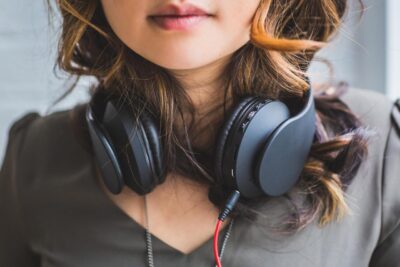Are you a music lover who can’t live without your headphones? Well, you may want to take note: recent studies suggest a possible link between wearing headphones and hair loss. If you’re worried about thinning locks, read on to discover the truth behind this controversial question of can wearing headphones cause hair loss.
Wearing headphones for an extended period of time can lead to friction on the hair and scalp, which may result in hair breakage or hair loss. However, it is important to note that hair loss caused by headphones is usually temporary.
Also, it can be prevented by taking proper precautions such as removing headphones every hour, opting for headphones that are not tight-fitting, and avoiding headphones that rest directly on the scalp. In severe cases, it is advisable to seek medical attention.
Hair loss and headphone use
Hair loss associated with headphone use is a growing concern among music lovers. The root cause of this issue is the friction created by the pressure of the headphones on the scalp and hair. This can lead to hair breakage and, eventually, hair loss, especially if the headphones are worn for an extended period of time.
It is important to take steps to prevent hair loss caused by headphone use. This can be done by opting for headphones that are not tight-fitting and avoiding headphones that rest directly on the scalp. You should also remove your headphones every hour to give your hair and scalp a break from the pressure.
In severe cases, it is advisable to seek medical attention. A medical professional can help determine the cause of hair loss and recommend the best course of action.
The effects of wearing headphones on hair health
Wearing headphones can put pressure on your hair and scalp, which over time, can cause hair breakage and eventually lead to hair loss. This happens because the headphones rub against the hair, leading to friction and tension on the hair shafts and roots. If you love music and spend a lot of time with your headphones on, you may have noticed your hair thinning out or falling out more than usual.
To keep your hair healthy while enjoying your tunes, it’s important to take steps to reduce the friction caused by your headphones. This can be done by wearing headphones that fit comfortably and don’t put too much pressure on your scalp. You can also avoid headphones that sit directly on your scalp and take breaks from wearing your headphones every hour to give your hair and scalp a rest.
If you’re experiencing hair loss, it’s best to consult a doctor. They can help determine if your headphone use is the cause and recommend the best treatment options for your hair health.
Furthermore, wearing headphones can put a strain on your hair and scalp and cause hair loss, but by taking some simple precautions, you can keep your hair healthy while enjoying your music.
How tight headphones can cause hair loss
Tight headphones can cause hair loss due to the increased friction and pressure they exert on the scalp and hair. When headphones are too tight, they can create tension on the hair roots and shafts, leading to breakage and, eventually, hair loss.
This is especially true for people who wear headphones for an extended period of time, as the constant friction can weaken the hair and make it more susceptible to breakage.
Wearing tight headphones can also restrict blood flow to the scalp, which can lead to poor hair health and growth. The combination of pressure, friction, and restricted blood flow can all contribute to hair loss.
It’s important to take steps to prevent hair loss caused by tight headphones. This can be done by wearing headphones that fit comfortably and are not too tight, opting for over-ear headphones instead of in-ear headphones, and taking breaks from wearing headphones every hour to give your scalp and hair a rest.
In severe cases, hair loss caused by tight headphones may be permanent and may require medical treatment.
If you’re experiencing hair loss and believe it may be related to your headphone use, it’s best to consult a doctor. They can help determine the cause and recommend the best course of action to restore your hair’s health.
Impact of prolonged headphone use on hair
Prolonged use of headphones can have a negative impact on the hair, especially if they are worn in a tight and restrictive manner. This can lead to hair getting tangled in the headphones, leading to pulling and breakage.
Additionally, the constant pressure from the headphones can cause hair to become flattened and damaged, leading to split ends and loss of volume. Furthermore, wearing headphones for long periods of time can also cause sweat to build up on the scalp, leading to itching and potentially dandruff.
To minimize the impact of headphone use on hair, it’s recommended to avoid wearing them for extended periods and to choose headphones that fit comfortably and do not put too much pressure on the hair.
Does wearing headphones cause hair loss or thinning?
Wearing headphones in itself is unlikely to cause hair loss or thinning. However, if the headphones are worn in a tight and restrictive manner, they can cause hair to become tangled and pull, leading to breakage. Over time, this can make the hair look thin and weak.
The constant pressure from the headphones can also cause hair to become flattened and damaged, leading to split ends and loss of volume. Additionally, wearing headphones for long periods of time can cause sweat to build up on the scalp, leading to itching and potentially dandruff.
These factors can contribute to the appearance of hair thinning or loss, but they are not directly causing hair follicles to stop producing hair. If you are experiencing hair loss or thinning, it is best to consult a dermatologist or trichologist to determine the underlying cause and receive appropriate treatment.
Factors that influence the link between headphones and hair loss
There are several factors that can influence the link between headphone use and hair loss:
- Frequency and duration of use: The more frequently and for longer periods headphones are used, the more likely they are to cause damage to the hair.
- Tightness of fit: Headphones that fit tightly against the scalp can put pressure on the hair and lead to pulling, tangling, and breakage.
- Material: Headphones made of rough or abrasive materials can cause friction against the hair, leading to damage.
- Scalp conditions: People with pre-existing scalp conditions, such as dandruff or dermatitis, may be more susceptible to damage from headphone use.
- Hair type: People with curly or kinky hair may be more prone to tangling and breakage when wearing headphones, while those with straight or fine hair may be more susceptible to damage from pressure and friction.
It’s important to keep in mind that while headphone use can contribute to hair damage, it is unlikely to cause hair loss or thinning on its own. There are many other factors that can impact hair health, including genetics, hormonal imbalances, and underlying medical conditions. If you are concerned about hair loss or thinning, it is best to consult a dermatologist or trichologist for an evaluation.
Prevention of hair loss from wearing headphones
To prevent hair loss from wearing headphones, it’s important to take some simple steps to protect your hair:
- Limit the frequency and duration of headphone use: Try to avoid wearing headphones for long periods of time and take regular breaks if you must wear them for extended periods.
- Choose headphones that fit comfortably: Look for headphones that have soft, adjustable headbands and cushioned ear pads to avoid putting pressure on your hair.
- Use gentle materials: Choose headphones made of soft, non-abrasive materials to reduce friction against your hair.
- Keep your scalp clean: Make sure to regularly wash your hair and keep your scalp clean to avoid the build-up of sweat and oil, which can lead to itching and dandruff.
- Take care of your hair: Regularly trim the ends of your hair to prevent split ends, and use hair care products that are appropriate for your hair type to keep it healthy and hydrated.
By taking these steps to protect your hair, you can minimize the impact of headphone use on your hair health and prevent hair loss. If you are experiencing hair loss or thinning, it is best to consult a dermatologist or trichologist for an evaluation and appropriate treatment.
Proper headphone fit to prevent hair loss
A proper headphone fit can help to prevent hair loss by reducing the amount of pressure and friction on the hair. Here are some tips for choosing headphones that fit properly to minimize hair damage:
- Adjustable headband: Look for headphones with an adjustable headband that can be tightened or loosened to fit your head comfortably. This will help to distribute pressure evenly and avoid putting too much pressure on any one spot on the scalp.
- Cushioned ear pads: Soft, cushioned ear pads can help to reduce friction against the hair and minimize tangling. Look for headphones with ear pads made of a soft material such as foam, leather, or fabric.
- Avoid over-ear headphones: Over-ear headphones can put pressure on the hair, especially if they fit tightly against the head. On-ear headphones, which sit on the ear rather than around it, maybe a better option for those concerned about hair damage.
- Take proper measurements: If you are purchasing headphones online, make sure to measure your head and compare the measurements to the manufacturer’s specifications to ensure a proper fit.
By choosing headphones that fit properly, you can reduce the amount of pressure and friction on your hair and prevent hair loss. If you are still experiencing hair damage or loss despite using properly fitting headphones, it is best to consult a dermatologist or trichologist for an evaluation and appropriate treatment.
The importance of taking breaks from headphone use
Taking breaks from headphone use is important for several reasons:
- Prevents hair damage: Wearing headphones for long periods of time can cause pressure on the hair and scalp, leading to tangling, breakage, and damage. Taking regular breaks can give your hair a chance to rest and reduce the amount of damage it experiences.
- Promotes scalp health: Wearing headphones for extended periods can cause sweat to build up on the scalp, leading to itching, flaking, and dandruff. Taking breaks can give your scalp a chance to breathe and promote healthy hair growth.
- Improves overall health: Prolonged headphone use can lead to discomfort, headaches, and eye strain. Taking breaks can give your body a chance to relax and reduce the risk of these health issues.
- Increases productivity: Taking regular breaks from headphone use can help to reduce fatigue and improve focus, leading to increased productivity and better overall performance.
It’s recommended to take a break from headphone use every hour or so for a few minutes to allow your hair and scalp to rest. If you must wear headphones for extended periods, consider switching to a different type of headset, such as over-ear headphones or bone-conduction headphones, to reduce pressure on your hair and scalp.
Different types of headphones and their effect on hair loss
Different types of headphones can have different effects on hair loss, depending on their design and fit. Here are some of the most common types of headphones and their potential impact on hair:
- Over-ear headphones: Over-ear headphones are headphones that fit completely over the ear. They can put pressure on the hair and scalp, especially if they fit tightly, leading to tangling, breakage, and damage. Over-ear headphones with adjustable headbands and cushioned ear pads can reduce the amount of pressure and friction on the hair and minimize hair damage.
- On-ear headphones: On-ear headphones are headphones that sit on top of the ear rather than around it. They generally put less pressure on the hair and scalp compared to over-ear headphones, making them a good option for those concerned about hair damage. However, it’s important to choose on-ear headphones with soft, cushioned ear pads to minimize friction against the hair.
- In-ear headphones: In-ear headphones, also known as earbuds, fit inside the ear canal. They generally put less pressure on the hair compared to over-ear or on-ear headphones, but they can cause tangling and damage if they are inserted and removed from the ear improperly.
- Bone conduction headphones: Bone conduction headphones use vibration to transmit sound directly to the inner ear, bypassing the hair and scalp entirely. This makes them a good option for those concerned about hair damage, as they do not put any pressure on the hair or scalp.
Ultimately, the type of headphones you choose will depend on your individual needs and preferences.
To minimize the impact of headphone use on your hair, it’s important to choose headphones that fit comfortably and are made of gentle, non-abrasive materials and to take regular breaks from headphone use.
If you are experiencing hair loss or damage despite using headphones properly, it is best to consult a dermatologist or trichologist for an evaluation and appropriate treatment.
Best practices for headphone use to prevent hair loss
To prevent hair loss from headphone use, it’s important to follow best practices for headphone use. Here are some tips to keep in mind:
- Choose the right headphones: Look for headphones with an adjustable headband and soft, cushioned ear pads to reduce pressure and friction on the hair and scalp. Consider using over-ear or on-ear headphones rather than in-ear headphones, and consider using bone-conduction headphones if you are particularly concerned about hair damage.
- Take regular breaks: It’s important to take breaks from headphone use every hour or so to give your hair and scalp a chance to rest. This can help to reduce pressure and friction on the hair and promote healthy hair growth.
- Be mindful when inserting and removing headphones: When inserting and removing headphones, be careful not to tangle or pull on your hair. Take care to hold the earbuds by the body of the headphone rather than the cord when inserting and removing them.
- Keep your headphones clean: Regularly clean your headphones to prevent the buildup of sweat and oil on the ear pads, which can contribute to hair damage.
- Avoid wearing headphones to bed: Wearing headphones to bed can put pressure on your hair and scalp while you sleep, leading to tangling, breakage, and damage.
By following these best practices for headphone use, you can reduce the risk of hair loss and promote healthy hair growth. If you are still experiencing hair damage or loss despite following these tips, it is best to consult a dermatologist or trichologist for an evaluation and appropriate treatment.
Recommended:
The role of genetics and other factors in hair loss
Hair loss, or alopecia, is a complex condition that can have a variety of causes. Genetics, hormones, and aging are some of the most common factors that can lead to hair loss; however, other factors such as stress, nutrition, and certain medications may also contribute to the condition.
Genetic factors play a significant role in hair loss. Male and female pattern baldness, or androgenic alopecia, is the most common form of hair loss and is caused by a combination of genetic and hormonal factors.
It is generally inherited from a parent and is more likely to occur if both parents have a history of balding. This condition tends to develop gradually over time and begins with thinning at the temples and crown.
Hormones also play a role in hair loss. An imbalance in hormones, such as an increase in testosterone, can trigger balding. This is particularly common in women who have polycystic ovary syndrome (PCOS). In addition, post-pregnancy hair loss is associated with hormonal changes, which can cause the hair to be thin or fall out.
Conclusion
If you are curious about the possibility of experiencing hair loss as a result of using headphones, then you are just in the right place. This page answers the question of can wearing headphones cause hair loss.




